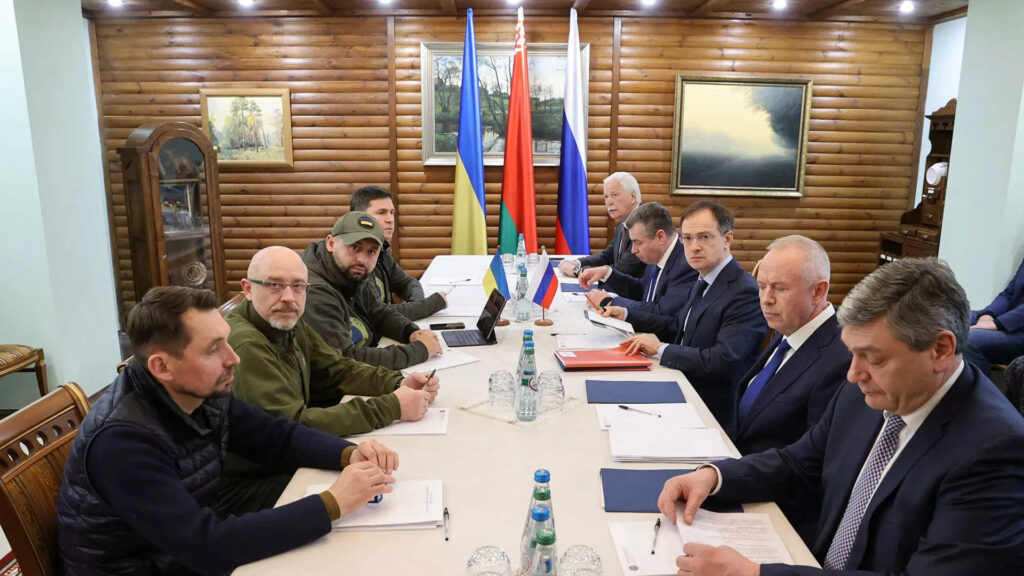Russian and Ukrainian negotiators held a third round of peace talks on Monday (local time) in the region of Brest, Belarus near the Polish border. The talks ran for almost three hours.
The Ukrainian delegation has given their Russian counterparts assurances that the humanitarian corridors will start working normally on Tuesday after being confronted with the issue point-blank, Russian chief negotiator Vladimir Medinsky has said.

Speaking to media after Monday’s talks, Medinsky said Russia hoped to sign protocols with the Ukrainian side on a number of issues already agreed upon in principle, but said this did not take place. Instead, the Ukrainian side has taken the package of documents brought by Russia to the negotiations home for further study, he said.
“I will speak frankly. Our expectations from the negotiations did not materialize, but we hope that next time we will be able to take more substantial steps forward. The talks will continue,” Medinsky said.
Ukrainian negotiator Mikhail Podolyak confirmed that a small amount of progress had been made in the talks regarding the need to improve the logistics of humanitarian corridors.
“The third round of negotiations has ended. There are small positive [developments] in improving the logistics of humanitarian corridors…Intensive consultations have continued on the basic political block of the regulations, along with a ceasefire and security guarantees,” Podolyak, who serves as an advisor to the office of the Ukrainian president, wrote on his Telegram channel.
“Regarding the political track, which includes a ceasefire, truce and an end to hostilities in general, intensive consultations will continue; today there are no results which significantly improve the situation, but nevertheless I emphasize once again that talks will continue,” Podolyak said.
Leonid Slutsky, another member of the Russian delegation, said he expects “difficult and consistent” work ahead, and indicated that a fourth round of talks will take place somewhere in Belarus.
“Negotiations will be continued quickly. We will not entertain the illusion that the final result will be reached at the next stage, or the stage afterward. This will be difficult and consistent work. We will not entertain hopes that our colleagues will immediately take a position close to ours and seamlessly carry it out,” Slutsky said.
Monday’s talks followed two earlier rounds of negotiations, also held on Belarusian territory. The first round was held last Monday, and ended inconclusively, apart from an agreement to continue talking. The second round took place last Thursday.
The Russian military announced a ceasefire and set up humanitarian corridors for civilians wishing to leave cities including Kiev, Mariupol, Kharkov and Sumy on Monday morning.
As the day dragged on, the MoD accused the Ukrainian side of failing to fulfill any of the conditions promised regarding the corridors. The Russian military also pointed to instances of threats, intimidation, blackmail and violence against civilians and foreigners, including against those seeking to make use of the humanitarian corridors by Ukraine’s ultranationalist battalions.
Russia launched what President Vladimir Putin dubbed as a “special military operation” aimed at “demilitarizing” and “denazifying” Ukraine on 24 February. The operation, being undertaken in coordination with Russia’s Donbass allies, began after weeks of escalating shelling, sniper and sabotage attacks against the Donetsk and Lugansk People’s Republics by Kiev forces.
The crisis in Ukraine is the culmination of a calamity which began in February 2014, when US and EU-backed political forces carried out a coup in Kiev and began pulling the country into the West’s economic and security orbit. The crisis prompted Crimea to break off from Ukrainian jurisdiction and rejoin Russia, and sparked a civil war in eastern Ukraine in the spring of 2014 which has continued to this day.
Image Credit: Sputnik News Agency